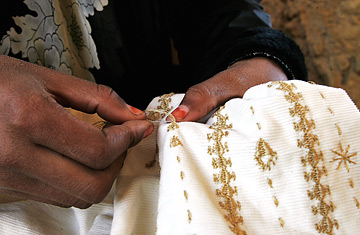
A Siwan girl threads local patterns onto a shirt to be exported to Europe.
Life is slow in the breathtakingly beautiful Egyptian oasis of Siwa, nine hours drive from Cairo. Palm and olive trees seem to float on vast expanses of salt lakes surrounded by serene sand dunes enveloping warm water springs. Siwa's inhabitants are of Berber origin, and live according to centuries-old traditions. But the forces of globalization and economic development have started a slow-motion social revolution in this remote oasis.
Siwi women have traditionally been kept behind closed doors or entirely concealed under flowing robes during rare ventures into town. The fact that they outnumber men in this conservative patriarchal society has made marriage the key to a woman's independence — unlucky was the girl who remained a spinster in her father's or brother's home, humbly tending to the needs of the other men and women in the family.
No longer. Neema, 24, now happily married to a supermarket owner and comparatively affluent, actually misses her days as an unmarried girl. That's because back then, she was the highest-paid woman in Siwa, earning more than $250 a month — more than most local men — as the star employee of Siwa Womens' Native Artisanship Development Initiative. The company was the brainchild of Cairo entrepreneur Laila Neamatalla who, together with her brother, leading environmentalist Mounir Neamatalla, have adopted a unique approach in their effort to plug Siwa into the global economy — the heritage hotels and local industries they have built are based largely on the skills, materials and traditions of the Siwa community.
While the hotels, eco-lodge, organic date farm, and olive and lake salt factories created jobs for the men of Siwa, however, "We had to get the women to work or the reason for development was incomplete," explains Laila Neamatallah.
The opportunity lay, once again, in local tradition — specifically in reviving the intricate Siwan embroidery on shawls, dresses and wedding dresses, an art which had been slowly deteriorating. Laila Neamatallah first approached local grandmothers, urging them to pass their embroidery skills on to their daughters and granddaughters, proposing that the women work as embroiderers at home so as not to offend the local sentiment.
Helped by a British development grant, the embroidery project started out small, but the quality of its product soon got the attention of the international fashion industry. Today, form-hugging jeans and sexy silk blouses embroidered by the traditional craftswomen of Siwa grace the catwalks of Milan for Italian designer Ermanno Scervino, while the brand name Siwa Creations sells in exclusive outlets in Turin, Florence, London, Paris and New York. "We wanted to make an authentic line that was wearable by a modern woman anywhere in the world," says Laila proudly.
As demand for their work grew, the families of the seamstresses reluctantly permitted them to work together at a workshop in the town. That was a breath of freedom for the girls who sit on cushions on the floor chatting while carefully using needles to work colorful silk threads and beads onto garments, bedding, cushions, and soft leather sandals and belts sent from Cairo or Florence. These sheltered women, most of whom have never set foot outside of Siwa, have been delighted to see recordings of the Scervino Milan show and images of beautiful women posing on the covers of Cosmo and Vogue in outfits stitched by their hands in isolated Siwa. The young women who are all covered in modest garments giggled at the site of the models, but were not offended by their different dress code.
Fayza, 21, proudly thumbs through a catalogue featuring products she and her colleagues created. "It is amazing to see how this work leaves our hands and is worn by women everywhere," she says. "We feel so appreciated and motivated to produce more and more." And the work has brought financial independence for Fayza and her friends, who are now in a position to make purchases without first asking the males of their households.
Despite — or perhaps because of — their financial independence, the young women of Siwa Creations have also become sought-after brides. Yet, once married, local tradition still precludes them from working outside the home. A married women in Siwa is permitted to work at home, but her priority is her husband, her children and family obligations.
"I dream of going back to work," says Neema wistfully. "They succeeded with breaking the taboo of work for the girls, but it will be long before they can do the same with [married] women. I hope that one day my daughters will be able to work as married women."
